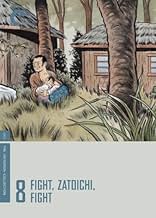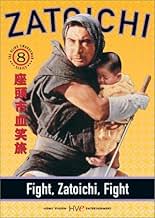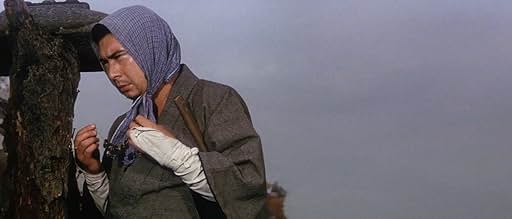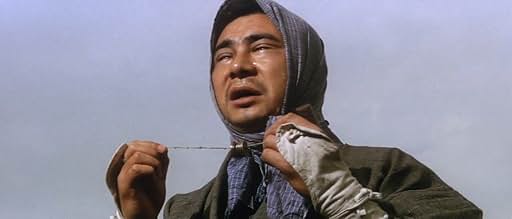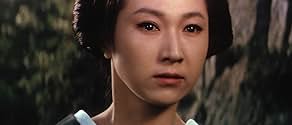Adicionar um enredo no seu idiomaWhen Zatoichi witnesses the murder of a young mother he promises to deliver the baby to the father. Along the way he gains the help of a reluctant criminal.When Zatoichi witnesses the murder of a young mother he promises to deliver the baby to the father. Along the way he gains the help of a reluctant criminal.When Zatoichi witnesses the murder of a young mother he promises to deliver the baby to the father. Along the way he gains the help of a reluctant criminal.
- Direção
- Roteiristas
- Artistas
- Prêmios
- 1 indicação no total
- Direção
- Roteiristas
- Elenco e equipe completos
- Produção, bilheteria e muito mais no IMDbPro
Avaliações em destaque
Zatoichi finds himself responsible for a mothers death, so he takes the woman's baby to deliver it to her husband some 60 miles away. Along the way he grows attached to the child, and turns into a bit of a mother hen, all the while being pursued by a group of hired killers. The bulk of the film (so far) is made up of scenes of Zatoichi with the child - my favourite of which (and possibly my favourite scene in the series so far) has Zatoichi buy the services of a whore to care for the child for a night, so he can finally get some much needed sleep. But he can't stop worrying about the child. Time and time again he rises, irritating the whore to no end, and the scene finally cross fades to the next morning, and the whore is out cold while Ichi nurses the baby. It also has a great gambling scene.
All the films have had something to offer so far. The third (new tale of Zatoichi) was the most visually pleasing; every shot was masterful. The film directly following it topped the third film in most other regards (such a great ending, with Zatoichi dancing off down a road with a grin on his face, which soured as soon as it was out of sight of the people the grin was intended for). But "Fight Zatoichi Fight" is the most satisfying film in the series so far. I love heartfelt sh-t like this.
Kenji Misumi is no stranger to directing Shintaro Katsu's famous protagonist. Zatoichi's screen debut was in Misumi's 'Tale of Zatoichi' in 1962. Just two years later and Katsu and Misumi are collaborating again for the film series' eighth instalment. However, 'Fight, Zatoichi, Fight''s script; by Seiji Hoshikawa, Kan Shimozawa and Tesuro Yoshido, offers audiences a much richer story than its seven predecessors.
While the Zatoichi film series instalments are invariably defined by Zatoichi having to rid a town of Yakuza, the eighth instalment offers an entirely more nuanced approach to the chanbara formula that fans have become so accustomed to, and fond of. 'Fight, Zatoichi, Fight' sees Japan's most notorious anma become embroiled in ensuring that a small child is safely reunited with its kin. Although this may seem a simple premise on the surface, the rich visuals Misumi brings to the screen through a surprisingly powerful script; in conjunction with Katsu's compelling performance, and augmented by a masterful score from Akira Ifukube, marinates together to create a delicious feast for the senses, and ostensibly the most memorable Zatoichi exploit.
Audiences have revelled in seeing Zatoichi single-handedly decimate entire Yakuza clans, and while such martial feats are entertaining and utterly expected of a chanbara jidaigeki (sword-fighting Japanese period drama), the repeated feats of Zatoichi can sometimes lack what 'Fight, Zatoichi, Fight' brings to the screen - vulnerability. The inner conflict conveyed by each: the story, the score and Shintaro Katsu, is what sets this film apart. Ifukube's master stroke of echoing a diegetic lullaby in the film's score, thrusts the audience into the emotion of the very heart and soul of what drives our protagonist in his quest to nurse and protect his newfound charge; a small child - inner conflict.
Zatoichi's questioning of his use of violence brought about by his evolving relationship with the child, sets a very different tone to the film in both style and theme. So profound a theme that one can see this echoed in later titles from Japan to Hollywood, such as 'Zatoichi Challenged' (1967), the 'Lone Wolf & Cub' film series (1972-1974), 'Leon: The Professional' (1994), 'Star Wars: Rebels' television series (2014-2018), 'The Mandalorian' television series (2020-2021), and 'Star Wars: The Bad Batch' (2021) to name but a few.
It is through creating vulnerability in the seemingly unstoppable protagonist that this film creates catharsis between audience and subject. While Zatoichi himself is nigh invincible due to his skill with a blade and his honed senses, those which he cares about are not only defenceless, but so too are they impressionable. In the same way that Zatoichi must protect the child from the perils of a dangerous and Yakuza infested land, he too is forced to consider what danger his way of life brings upon the head of the child which he has vowed to protect. Such is the double-edged blade of Zatoichi's shikomizue.
If you can not commit yourself to watch all 26 of Shintaro Katsu's film outings as Zatoichi, do yourself a favour, and try this one. It's as surprisingly tender as one of Ichi's massages, but it cuts as deep as a katana.
The emphasis in this film is drama. There is less sword fighting, so if your interest in the series is purely for the fighting sequences, move on to another entry. For all others who enjoy a mixture of drama and action, this is a fantastic film that is sure to bring some moisture to your eyes.
Just as an aside, I don't know how the international English title became Fight, Zatoichi, Fight. The Japanese Kanji literally mean Zatoichi Blood Smile Travel, giving the feeling of both violence and happiness.
The movie with the misleading title stands out for three reasons. First of all, Zatoichi becomes surprisingly caring, emotional and tender as he grows fond of the baby boy he protects. Secondly, the movie includes a lot of slapstick humor with Zatoichi stealing clothes on a scarecrow to use them as diapers, with the infant child accidentally peeing on two angry sumo ringers and with a group of elderly blind people who fool the group of samurai that are chasing Zatoichi in hilarious manners. Thirdly, the addition of a kleptomaniac prostitute is quite interesting as she turns out being a very clumsy, emotional and romantic drama queen who often argues with Zatoichi. These three elements add a fresh touch to the Zatoichi franchise and offer several truly memorable scenes such as Zatoichi attempting to breastfeed the baby.
On the other side, the movie doesn't really have an intriguing plot as it basically follows Zatoichi on his way to bring the child to its father. The movie is lacking action and tension as fight scenes are rarely shown and not particularly well choreographed. The movie rather feels like a slice of life promoting family values and adding lots of slapstick moments. It lacks the choreography, intensity and seriousness that gave the previous entries their very own identity.
In the end, this film is a quite unusual one. Those who are expecting vivid sword fights, a tense plot and an intriguing antagonist will end up being disappointed. If you like a more cute, emotional and humorous touch to martial arts films, this film could be among your favorites of the franchise. This is the kind of movie I would show my girlfriend if I had to introduce her to the Zatoichi franchise. The movie recalls the Lone Wolf and Cup franchise or martial arts classics like The Master and the Kid with the difference that this visionary movie was released about a decade before those movies. Even though Fight, Zatoichi, Fight isn't exactly my cup of tea and among the weaker films in the franchise in my book, one can't deny that it has quite a few creative ideas and its very own original style.
Not that he doesn't try to talk reason to his assailants. He deters an angry samurai without blood or violence in a scene I felt was so unusual, I played it back three times in a row. I LOVE martial arts sequences, but, the reason that I watch this one again and again is the acting and the natural building of his relationship with the infant that he has decided to help.
If you want to sample the Zatoichi series, I would certainly recommend this one to be your first...
Você sabia?
- CuriosidadesThis is the eighth of 26 films to star Shintaro Katsu as Zatoichi.
- Citações
Temple priest: Leave the child here with me.
Zatoichi: You must be joking, Monk. I already decided I would raise this child myself, whatever it takes. I wish you wouldn't kid around like that.
Temple priest: Do you really think you can do it?
Zatoichi: You don't think I can?
Temple priest: That's right. You're blind and unmarried. On top of that, you're a yakuza and a drifter. You go from one journey to another living dangerously in the gleam of an unsheathed sword. Living with a man like that, how long do you think this child would survive? And suppose he did survive. Do you want him to grow up to be a yakuza and a drifter like yourself? You may think I'm being harsh, but it's the best thing for the child. If you really love him, leave him with me.
- ConexõesFeatured in Best in Action: 1964 (2020)
Principais escolhas
- How long is Fight, Zatoichi, Fight?Fornecido pela Alexa
Detalhes
- Data de lançamento
- País de origem
- Idioma
- Também conhecido como
- Fight, Zatoichi, Fight
- Empresa de produção
- Consulte mais créditos da empresa na IMDbPro
- Tempo de duração1 hora 27 minutos
- Proporção
- 2.35 : 1
Contribua para esta página


